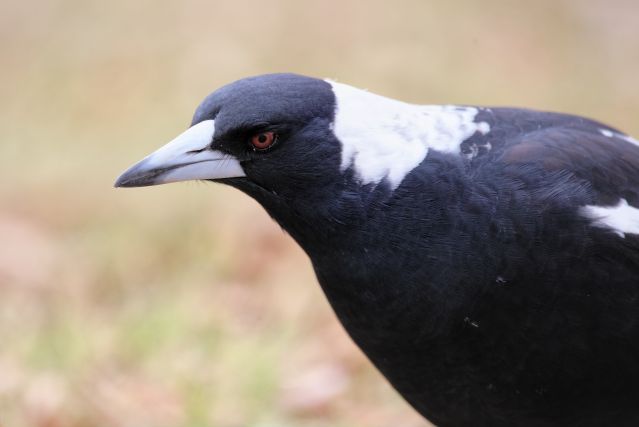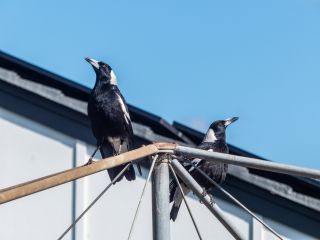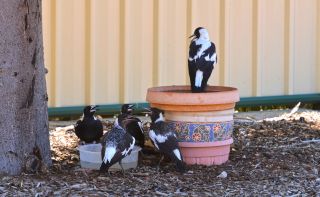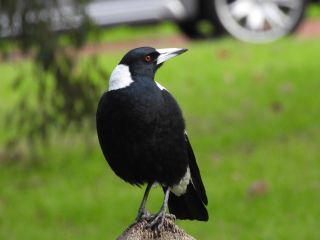Animal Behavior
Smarter Birds Cope Better with City Noise
Australian magpies that are quick learners are less affected by urban noise.
Updated October 25, 2023 Reviewed by Lybi Ma
Key points
- Researchers used observations, playbacks, and cognitive tests to see how Australian magpies respond to noise.
- In the presence of human-made noise, magpies foraged less, vocalized less, and were more vigilant.
- Most magpies were less able to respond appropriately to alarm calls in the presence of loud human-made noise.
- Quicker learners were more able to maintain an appropriate response to alarm calls, even in noise.

Australian magpies have made themselves at home in human cities, but that doesn’t mean that urban environments are free of challenges. New research suggests that human noise pollution affects the songbirds’ ability to forage for food, communicate, and respond to alarm calls—but smart birds are better able to cope with this noise.
Urban Bird Behavior
Human noise pollution is increasing and affecting ecosystems worldwide. That’s bad news for animals. Research in the last two decades shows noise has a broad range of adverse effects that make it harder for animals to communicate, reproduce, find food, and behave naturally.
Most of the research on the effects of noise on wild animals has looked at how a population or species is affected, says Grace Blackburn, a Ph.D. candidate at the University of Western Australia. However, individual differences may enable some animals to cope better than others.
For the new study, Blackburn and her colleagues focused on how differences in cognitive ability influence individual responses to noise in a population of Australian magpies living in Perth, Western Australia. These birds have been studied consistently since 2013 and most have been fitted with colored bands on their legs for easy identification.

First, the researchers followed 75 wild magpies for 20-minute periods, noting all their behaviors and the presence of any human-made noise.
Next, they conducted playback experiments in which they broadcast magpie alarm calls with and without the noise of planes in the background to see how the noise affected individuals’ anti-predator responses.
The final step was administering a cognitive test to the magpies. Blackburn and colleagues used an associative learning task in which the magpies had to associate a specific color with a food reward. “The smarter the bird, the quicker they learn this association,” says Blackburn.
Responding to Noise
From their observations, the researchers saw that loud human-made noises (such as traffic, planes, and leafblowers) resulted in changes in the magpies’ behavior. In the presence of noise pollution, the birds foraged less, were less efficient at finding food, vocalized less, and spent more time being vigilant.
Human-made noise may alarm or distract magpies, forcing them to spend more time on the alert to potential threats. Noise may also drown out the sound of insects rustling in the leaf litter, making foraging more difficult.
The playback experiments revealed that plane noise made it harder for the birds to respond to a magpie alarm call (used to warn others of predators). About 37 percent of birds fled for cover when an alarm call was played by itself. When the noise of a plane flying overhead was added to the alarm playback, only 8 percent of the birds sought cover.
Blackburn says these effects are consistent with findings in other species and could be detrimental to survival. “If they are foraging less, they won’t be as able to maintain body condition and feed their offspring,” she says. “If they are unable to respond appropriately to alarm calls, they might not get away from a predator in time.”

However, Blackburn and colleagues found that cognition influenced how magpies responded to plane noise. Birds that performed better in the associative learning task were able to maintain their normal responses to alarm calls, even when those calls were played with noise. The results suggest that smarter magpies may be better at overcoming the negative effects of noise pollution and maintaining their appropriate response to alarm calls.
“This is the first time that cognition has been linked to the ability of an animal to deal with human-made noise and it shows that cognition may be able to help animals respond to environmental change,” Blackburn says.
Adapting to a Changing World
The researchers are not positive of the mechanism or mechanisms that allow smarter birds to better deal with noise. They say it’s possible that individuals with better associative learning abilities may form a stronger association between alarm calls and threats, and this stronger association is more likely to hold up when noise is present.

Alternatively, birds with better associative learning may also score higher in other aspects of intelligence. Previous research on Australian magpies demonstrates that birds who perform better in one cognitive task show higher performance in other cognitive abilities. It may be that fast learners are also better at discriminating or attending to multiple sources of acoustic information.
As the human population continues to grow and expand, understanding the role of cognition in how animals deal with environmental changes could prove useful in helping protect not only Australian magpies but other affected wildlife.
“This kind of research can help inform management strategies and legislation to protect species in our ever-changing world,” says Blackburn.
“If we are going to have any chance of protecting and conserving species into the future, we need to know how we’re affecting them in the first place. I hope that research like this will make people stop and think about the effect that they’re having on the wildlife with which we share our urban environments.”
References
Blackburn G, Ashton BJ, Thornton A, Woodiss-Field S, and Ridley AR. 2023. Cognition mediates response to anthropogenic noise in wild Western Australian magpies (Gmynorhina tibicen dorsalis). Global Change Biology. Doi: 10.1111/gcb.16975.




